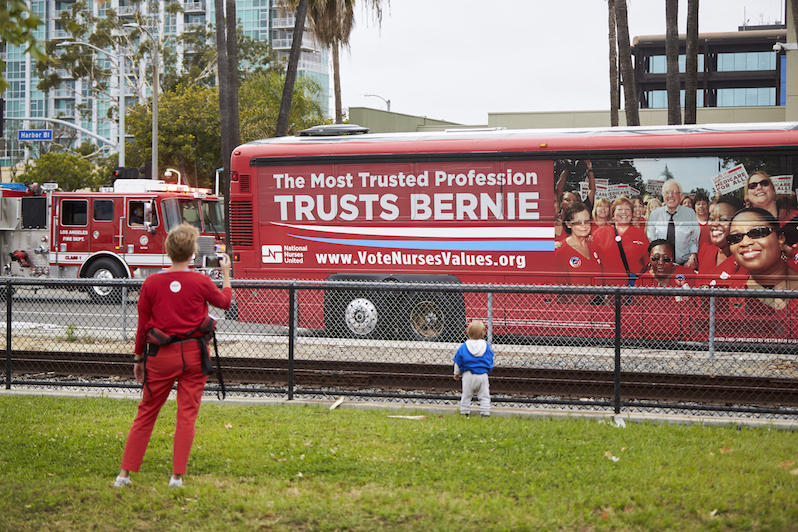How the Internet Is Empowering the Grass Roots and Transforming Democracy
While super PACs and superdelegates have been the focus of the public’s attention and frustration, an overlooked narrative is how eager people—especially the young—experience and participate in the political process in nontraditional ways. The 2016 race to the White House has not been politics as usual in the United States. (Damian Dovarganes / AP)
The 2016 race to the White House has not been politics as usual in the United States. (Damian Dovarganes / AP)
By Kyle Jackson
The 2016 race to the White House has not been politics as usual in the United States. (Damian Dovarganes / AP)
Volunteer mobilization has long been a key factor in winning presidential elections. But this cycle’s populist swell has been characterized by the unprecedented extent of grass-roots organizing carried out on the Internet, a phenomenon that was essential to the success of Barack Obama eight years ago.
Instead of depending on networks of party insiders, lobbyists and endorsements from popular incumbents, the “outsider” campaigns of Donald Trump, Bernie Sanders and even Ted Cruz have generated massive support without those traditional sources of party legitimacy. They’ve used creative alternative methods to raise funds and get their message out, relying on the boundless utility of the Internet to bring together diverse groups of people and empower them to organize on their own.
Thousands of events and benefits have been thrown together and coordinated entirely on the web, ranging from phone-banking pizza parties to door-knocking walks to DIY punk-rock festivals and everything in between. Official websites for each candidate compile these scattershot efforts into accessible maps and calendars so supporters can find events near them, greatly extending the reach of small niche groups without ties to the actual campaign headquarters.
While super PACs and superdelegates have been the focus of the public’s attention and frustration, an overlooked narrative is how eager people—especially the young—experience and participate in the political process in nontraditional ways.
For some, it never goes beyond the much-decried “armchair activism”—or, perhaps more aptly, “hashtag activism”—that social media encourages.
For others, it has meant attending the massive rallies Trump and Sanders have mustered throughout the country, in stark contrast to the intimate, big-money fundraisers hosted by more traditional politicians like Hillary Clinton and Jeb Bush.
But for many Americans, having a stake in this election has meant self-organizing and networking outside of official campaign structures.
In the next week alone—the last before the June 7 primary in California—Sanders supporters in Los Angeles will host nearly 200 small-scale events in homes, businesses, and public parks from Burbank to Compton.
Not to be outdone, Clinton backers also have dozens of meet-ups planned, including a Memorial Day barbeque in the hipster Echo Park neighborhood, a “Millennials for Hillary Trivia Night” at a trendy wine bar and a “Bros4Hillary” election-night watch party.
As both parties struggle to put a messy primary season behind them and look towards the November general election, they would be wise to focus on the importance of grass-roots messaging, organizing and empowerment, and how ordinary people are fundamentally reshaping participatory democracy in the digital age.
We used the Evrybit mobile storytelling app to cover a recent “Beats for Bernie” campaign event.
Kyle Jackson is a Los Angeles writer, musician and historian. He is a contributor to Common Sense Media and is currently developing a podcast about California history.
Your support matters…Independent journalism is under threat and overshadowed by heavily funded mainstream media.
You can help level the playing field. Become a member.
Your tax-deductible contribution keeps us digging beneath the headlines to give you thought-provoking, investigative reporting and analysis that unearths what's really happening- without compromise.
Give today to support our courageous, independent journalists.









You need to be a supporter to comment.
There are currently no responses to this article.
Be the first to respond.